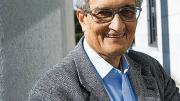The Idea of Justice, by Amartya Sen, Lamont University Professor (Harvard, $29.95). The Nobel Laureate explores philosophical notions of the “just society,” motivated, as ever, not just by theoretical reasoning, but by the search for applications to (and appreciation of) different societies, their conceptions of what is just, and the “advancement or retreat” of what is just.
1688: The First Modern Revolution, by Steve Pincus, Ph.D. ’90, JF ’94 (Oxford, $35). A sweeping reinterpretation of England’s Glorious Revolution—embracing foreign policy, religious culture, and political economy—that argues for its status as the first modern, truly transformative revolution. The author is a professor of history at Yale.
The Modern Period: Menstruation in Twentieth-Century America, by Lara Freidenfelds ’94, Ph.D. ’03 (Johns Hopkins, $60). An examination of middle-class mores and modernity through close study of menstrual products and practices. Illustrated by advertising and instructional materials—for instance, a Kimberly-Clark pamphlet instructing girls to take walks but not to hike or jump rope during their periods.
The Hardest Questions Aren’t on the Test: Lessons from an Innovative Urban School, by Linda F. Nathan, Ed.D. ’95 (Beacon Press, $25.95). A practical discussion of teaching, race, the achievement gap, and more, by the founding principal of the Boston Arts Academy.
Genius of Common Sense, written and illustrated by Glenna Lang and Marjory Wunsch, M.A.T. ’65, M.Arch. ’74 (Godine, $17.95). A young-readers’ introduction to Jane Jacobs and the revolution in urban planning effected by The Death and Life of Great American Cities.
The Virgin Warrior, by Larissa Juliet Taylor, A.L.B. ’81 (Oxford, $35). A life of Joan of Arc as electrifying leader, in the context of her times, by an associate professor of history at Colby College.
Engineering Invention, by Frederick Dalzell, Ph.D. ’93 (MIT, $30). A lively business history of Frank Sprague, Edison colleague and competitor and serial innovator, who pioneered inventions that led to electric railroads, elevators, and more.
A Fiery Peace in a Cold War: Bernard Schriever and the Ultimate Weapon, by Neil Sheehan ’58 (Random House, $35). A sweeping history of the Cold War, nuclear deterrence, and the development of the intercontinental ballistic missile, by the Pulitzer Prize-winning journalist who obtained the Pentagon Papers.
Nerds on Wall Street: Math, Machines, and Wired Markets, by David J. Leinweber, Ph.D. ’77 (Wiley, $39/95). It takes an applied-math doctorate to unveil the technologies and algorithms that drive modern Wall Street. Not always easy reading, but leavened with humor: a derivatives-driven program used by Fannie Mae is described as “a divining rod…held by a suicide bomber.”
Sowing the Seeds of Character, by Judd Kruger Levingston ’86 (Praeger, $44.95). A rabbi and educator, the author addresses the challenges of and techniques for conducting the moral education of adolescents, in public or private schools—recognizing that this is a fundamental part of their mission, whether conducted explicitly or only implicitly.
American Chinatown: A People’s History of Five Neighborhoods, by Bonnie Tsui ’99 (Free Press, $25). A journalistic exploration, from the oldest (San Francisco) to the biggest (New York) and beyond (Los Angeles, Honolulu, Las Vegas).
Inventing Equal Opportunity, by Frank Dobbin, professor of sociology (Princeton, $35). In this closely researched work, Dobbin argues that corporate personnel managers and norms defined the policies and procedures that have come to govern hiring, promotion, and firing—and thus defined discrimination. Legislation and litigation, he argues, merely followed, codifying what have become ever-widening affirmative-action and diversity practices.
Strength in What Remains: A Journey of Remembrance and Forgiveness, by Tracy Kidder ’67 (Random House, $26). Kidder follows the pilgrimage of Deogratias Niyizonkiza, A.M. ’02, from genocide in Burundi through camping out in Central Park, making his way through Columbia to the Harvard School of Public Health, and back to his native land to provide care to his impoverished community.









